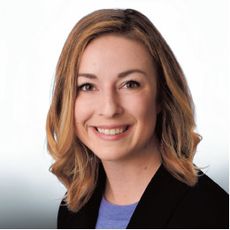
Portfolio shift: More Maine women make their mark in wealth management
 Photo / Tim Greenway
Tracey Daigle, a certified financial planner and chief compliance officer at Robinson Smith Wealth Advisors in Portland, is one of a growing number of women with key roles in the wealth management sector.
Photo / Tim Greenway
Tracey Daigle, a certified financial planner and chief compliance officer at Robinson Smith Wealth Advisors in Portland, is one of a growing number of women with key roles in the wealth management sector.
From college history major to wealth management, Tracey Daigle’s route to a financial planning career was indirect — and unexpected.
After working at a bank, her in-laws’ farming business, running a home daycare and then at a small construction firm that laid her off, she found her true calling at Robinson Smith Wealth Advisors in Portland.
“Everything that has gotten me here makes me better at what I do now,” says Daigle, a certified financial planner who also serves as chief compliance officer and became an equity owner in the five-person firm last year. “I’ve been a mom, I’ve worked with my husband and his family, I’ve been laid off, I’ve changed jobs and done very different things,” she says. “That gives me a broad base to understand people, and that’s a lot of the job.”
Though wealth management remains a male-dominated and macho-image industry, Daigle is among a growing number of women in Maine making their mark in the profession. While many are in Portland, they’re also in places like Waterville, where Golden Pond Wealth Management financial advisor Katie Brann is eager to see others enter the field.

“I feel like girls grow up knowing that they can be nurses and teachers, but no girl ever thinks about a career in banking,” she says. “Just like we have initiatives to promote women in STEM, I would love to see something like that for women in finance.”
‘Problem of attraction’
Nationwide, wealth management remains a man’s world. Out of 86,239 certified financial planners counted by the Washington, D.C.-based CFP Board, less than a quarter (23.2%) are women. It commissioned a study in 2013 to look at why that is, and outlined potential solutions.

Researchers pointed to the main problem as one of attraction, not retention: “All else being equal, women simply are less knowledgeable about financial planning and CFP certification than men. If they don’t know these opportunities exist, they certainly cannot pursue them.”
Yet even when there is awareness, researchers noted that women may harbor misconceptions about what the profession entails. Many believe it to be primarily about investments, sales and production, and that it requires significant math skills, not appreciating that softer skills or relationship-building and understanding of family dynamics are just as important, the report found.
To remedy the situation, the CFP Board in its Women’s Initiative recommends educational efforts starting with school-age girls, as well as encouraging women in MBA and other business programs to consider financial planning as an alternative career to more traditional paths of investment banking and management. It also suggests making women leaders in the profession more visible to broad female audiences and using national women’s professional networks to get the word out about financial planning as a great career for women. Those efforts are already having an impact, with the CFP seeing 4,000-plus new female professionals since 2016, a 53% jump since 2013-15.
Women at the helm
In Maine, women lead a handful of wealth management firms. One that stands out is Spinnaker Trust, a Portland-based firm led by Amanda Rand, who succeeded founder Dick Curran as president and CEO in 2018.
The firm, which started with six people in 2001, now manages $2 billion in assets for a global clientele. Out of 33 employees today, 24 are women — including five of seven executive leadership team members.

“It wasn’t by design,” says Rand, from her home office in Falmouth, saying that Curran was gender-blind from the beginning. “He surrounded himself with the smartest people at the time [and] a lot of them happened to be women.”
Rand says that gender-blindness remains part of the culture, with women “all over the company” in different roles. “We’re lucky we did that in the early stage of the business,” she says. “Smart women tend to know other smart women, and that referral network starts to feed on itself.”
Rand got into wealth management not via a business school or banking background, but as a history major turned Harvard-educated attorney specialized in estate planning. Estate planning remains an important part of her job. Her favorite part is working with advising families — many of whom are in their third generation as Spinnaker clients.
She says that while Spinnaker has loads of adept male advisors, women may be more inclined to be a steward and gentle guiding force for clients — which becomes even more important during the turbulence brought about by COVID-19. “It’s times of crises like this where I think any financial advisor earns their keep.”
Equally important is the investment side of the equation, headed at Spinnaker by Jessamyn Norton. The firm’s chief investment officer since 2011, she says that working with so many women is in stark contrast to her previous life as an equity analyst picking stocks for Fidelity Investments and other big institutions.
At Fidelity when Norton covered companies from emerging-market countries with strong male-dominated cultures, “I was often the only girl in the room and I was fine with that.” Today in Spinnaker’s inclusive environment, “that feels at home now.”
Much newer to Portland after opening an office last year, Boston Financial Management has a three-person team there headed by industry veteran Abby Psyhogeos. The Falmouth native joined Boston Financial in July 2018, opening a Portland office on Commercial Street the following year.
Looking back at the start of her career a month before the 1987 market crash, Psyhogeos says her technology background saved her, and doesn’t see the current market jitters as a deterrent to women entering the profession.
“When you have a crash or volatility like we’re having right now,” she says, “it can be an opportunity.”
Katie Exchange, a 2013 University of Maine graduate who works closely with Psyhogeos, is equally enthusiastic less than two years after joining the firm. A licensed CFP and associate wealth manager, she’s being groomed as Psyhogeos’ successor after falling in love with a profession she ended up in by chance.

“I love the people aspect of this business,” Exchange says. “You really get to know your clients, and you become almost like a partner for them in reaching their goals.”
F.L. Putnam Investment Management Co.’s Ellen Flaherty has a similar observation after 30 years with the firm, where as chief operating and chief compliance officer she oversees daily operations and regulatory issues, saying:
“One of the things I like about what we do to this day is that our clients do well and we do well. Our interests are always aligned.”
Though run by a man, President and CEO Tom Manning, 50% of F.L. Putnam’s employees are female — Maine has a higher percentage—and serve on its board of directors. Flaherty, the second-highest ranking person at F.L. Putnam and one of three female board members, leads an eight-person operations team, of whom five are women.
Newer to the firm is Meghan Civiello, a chartered financial analyst and investment advisor who joined the Portland office last year.

After 12 years of institutional equity research and strategy, Civiello says F.L. Putnam is her first experience working with so many women. One of five women on the 15-member investment team, she says: “My colleagues on the investment committee are intellectual powerhouses, and I feel very lucky to be at a small firm with that kind of prowess.”
Lest anyone think all the women-led firms are not inclusive of men, Cornerstone Financial Planning — a boutique operation run by Susan Veligor and Jill Boynton in Portland and Newington, N.H. — just hired its first man, a financial planner-in-training who started a week before they went to remote operations.

“He’s bright and sharp, he’s got a journalism degree and a dry humor,” says Veligor, who says their new colleague doesn’t mind being the token male. “We asked him about this, and I think he had a very strong role model in his mother.”
Bright future, building relationships
Women of all experience levels interviewed for this article see a bright future for young peers starting out today.
As for career advice, Psyhogeos recommends earning the trust of others whether it be a client, colleague or external associate, noting: “People always want to do business and seek advice from those that they trust.”
Her other two tips: Always demonstrate excellence even in the most menial tasks, and master your oral and written communication skills, including taking the time to check any correspondence before sending it out.
“I would encourage young women to consider a career in wealth management, because I have found it to be a rewarding way to marry the analytical challenge of investing, planning and problem solving with the satisfaction of helping your clients and their families reach their goals,” says Spinnaker’s Rand. “ I would also encourage anyone starting out in the profession to try to identify a mentor that will invest in you. I have been the beneficiary of some amazing mentors over the years and it has helped me exponentially.”
Back at Robinson Smith, Daigle says: “Entering a profession that deals with something as personal as someone’s finances is difficult, you need a broad knowledge base that people will trust, but you also need to be a person people can trust. The relationships you build with your clients will help them and you make it through the ups and downs of the markets.”














0 Comments